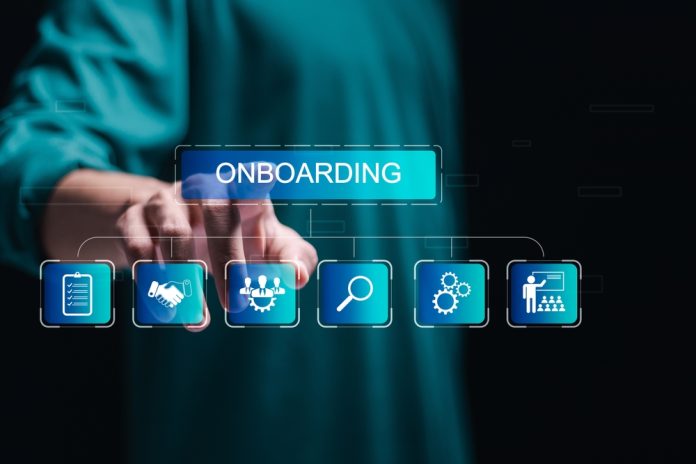
A new type of employee began entering the workforce this spring—the pandemic freshman. This cohort began their college education at the height of the COVID-19 pandemic when most everything was virtual. These graduates are the first to spend their entire college career in a hybrid or virtual environment, making them adept at learning in online settings. Upon graduation, they certainly will be looking for flexible, customized, digital working environments.
Businesses need to reinvent how they operate to meet the needs of this—and future—graduating classes. This change begins with providing a digital onboarding experience.
The traditional onboarding approach provides a poor employee experience, especially for Gen Z employees, resulting in higher turnover, lower productivity, and decreased engagement. Sitting in an hours-long onboarding lecture and sorting through mountains of papers to identify what’s pertinent to them will not be an effective strategy. Employers must meet employees where they are, and in the case of this 2024 graduating class, that’s on their devices.
How to Create a Digital Onboarding Program
When building a digital onboarding experience, companies must include the following elements.
- Automated workflows: Today’s busy employees don’t have time for tedious processes. You don’t have time for them either. The more you can automate workflows, the more efficiently everyone can work. Automation saves time and effort while also reducing human error and delays.
- Digital documentation: There’s no getting around it—onboarding requires significant amounts of paperwork. Digital tools can streamline document management. Instead of gathering, printing, mailing, filling out, returning, and processing forms, both HR and new employees complete and manage the documents digitally, saving paper and time.
- eLearning: These new employees spent four years learning online. They can do the same with work onboarding. Digital courses enable new hires to familiarize themselves with company policies, culture, and role-specific information at their own pace and in their preferred setting, which encourages engagement. eLearning also allows you to provide different content formats, such as videos, quizzes, and interactive discussions.
- Customized experiences: Every person and role is different. To build an effective onboarding process, you must provide customized experiences. With digital tools, you can tailor the experience to individuals, ensuring each employee receives the critical knowledge they need to do their jobs successfully.
The Benefits of Digital Onboarding
Onboarding requires significant time and effort, and information, communication and documents sometimes can fall through the cracks. Technology fills in gaps to support HR and new employees from beginning to end. Benefits include:
- Reduced administrative burden: Digital tools eliminate stacks of paperwork, and automation completes burdensome administrative tasks such as document collection and verification. New hires can focus on learning their new role, while HR staff direct attention to strategic initiatives, such as relationship building and employee experience.
- Timely information delivery: Digital solutions ensure that new hires have the information they need when they need it. Software can automate messages, such as required forms or task reminders, reducing the burden on HR while ensuring timely notification. Employees also can access learning and administrative resources whenever and wherever.
- Fewer errors: Manual processes create opportunities for human error, such as a missed form or a typo. Automation safeguards against these pitfalls, boosting organizations’ confidence in the accuracy and compliance of their data.
- Regulatory compliance: Automation can monitor data to check for compliance with regulations, reducing legal risk.
- Personalization: Personalizing onboarding education and paperwork for each new hire will help improve engagement, a sense of belonging, and productivity. However, it can be a time-consuming process. Automation can reduce the workload and allow HR to spend more time creating customized and engaging experiences for their employees.
The Importance of Personalization
Gen Z grew up with technology, which shaped their world experience. They use technology for almost everything and have grown accustomed to the efficient, easy, individualized experience provided by devices. They will anticipate that employers will use the same technology and provide a customized experience. Therefore, employers will benefit by recognizing each employee’s uniqueness and personalize onboarding accordingly.
For example, an employer might create a personalized video greeting the new person by name and discussing role-specific responsibilities. The company also could provide a customized onboarding curriculum based on the person’s interests, goals, and past experiences. Personalized onboarding also means tailoring the content delivery and pace.
Building personal attention into your process will enhance the experience even more. For example, guidance and coaching opportunities can build confidence and skill in new employees. Digital coaches deliver individualized support and feedback to each person, ensuring alignment between individual goals and the organization’s overarching objectives. Throughout the onboarding journey, new hires can engage with their coach to discuss their experience, express concerns or questions, and seek guidance on career advancement within the organization. These interactions foster trust and open communication, ultimately enhancing employee engagement and connection.
As Generation Z joins the workforce, employers should respond with modern, tailored onboarding that digitally engages from day one. When done right, digital onboarding makes employees feel valued as individuals rather than just workers, fostering trust, engagement, communication, job satisfaction, and confidence. By evolving onboarding into an immersive digital experience, organizations gain a competitive edge in attracting and keeping top young talent. The future of work is here—and personalized digital onboarding is how leading companies will enable it.




